Car Finance Ownership: Understanding Legal Rights and Responsibilities
Understand car finance ownership structure
When you finance a car, the ownership structure become more complex than a straightforward cash purchase. The legal owner and the person drive the car day by day are oftentimes different entities, create a web of rights and responsibilities that affect everything from insurance claims to sell decisions.
Most car buyers assume they own their finance vehicle, but the reality involves multiple parties with different legal standings. The finance company, the registered keeper, and the legal owner each hold distinct positions that determine who can make decisions about the vehicle.
Legal owner vs. Registered keeper
The legal owner holds the title to the vehicle and possess ultimate authority over major decisions. In most finance agreements, the lending institutionmaintainsn legal ownership until the loan is fulto repayay. This arrangement protect the lender’s investment while allow the borrower to use the vehicle.
The registered keeper, typically the person finance the car, handle day to day responsibilities like registration renewals, traffic violations, and maintenance decisions. This person’s name appear on the registration documents and insurance policies, but they don’t hold legal title.
These distinct roles create important implications for various situations. Insurance companies recognize the registered keeper for policy purposes, but legal ownership affect claims settlements and total loss situations. Understand this distinction help prevent confusion during insurance claims or legal disputes.

Source: jolt.richmond.edu
Types of car finance and ownership rights
Different financing arrangements create vary ownership structures. Hire-purchase agreements typically designate the finance company as legal owner until final payment, after which ownership transfers to the buyer. This clear progression make hp agreements straightforward regard ownership timelines.
Personal contract purchase plans oftentimes maintain finance company ownership throughout the agreement term. Evening after make all schedule payments, the buyer must exercise a final balloon payment option to gain legal ownership. Without this final payment, the vehicle return to the finance company.
Personal loans for car purchases create different ownership dynamics. Since the loan isn’t secure against the vehicle, the buyer become the legal owner instantly. The lending bank holds no claim to the car itself, solely the right to collect loan payments.
Lease agreements maintain finance company ownership throughout the contract period. The lessee ne’er gain legal ownership rights, disregardless of payment history or contract duration. These arrangements focus on usage rights quite than ownership progression.
Rights and limitations of financed car owners
Register keepers of finance vehicles enjoy most ownership benefits while accept certain limitations. They can drive the vehicle, arrange insurance, and handle routine maintenance without seek permission from the legal owner. These practical ownership rights support normal vehicle usage.
Nonetheless, significant limitations exist regard major decisions. Sell the vehicle require legal owner consent, typically involve loan payoff procedures. Modifications that affect vehicle value may violate finance agreement terms, potentially create legal complications.
The legal owner retain repossession rights if payments fall can or agreement terms are violated. This powerful rightprotectst the lender’s investment but can leave register keepers without transportation despite having make substantial payments.
Insurance requirements oftentimes specify both legal owner and register keeper details. Fail to right identify these parties can void coverage, leave all parties financially expose during accidents or theft situations.
Sell a financed vehicle
Sell a car under finance require careful coordination between multiple parties. The legal owner must release their interest, typically through loan payoff procedures. Outstanding balances must be settled before title transfer can occur.
Negative equity situations complicate sales processes. When the loan balance exceeds vehicle value, sellers must pay the difference to complete the transaction. This additional payment requirement can prevent sales or force sellers into difficult financial positions.
Trade in transactions oftentimes simplify finance vehicle sales. Dealerships handle payoff procedures and title transfers as part of the new vehicle purchase process. Notwithstanding, negative equity typically roll into new financing arrangements, increase future payment obligations.
Private sales require more complex procedures. Buyers oftentimes feel uncomfortable with outstanding liens, prefer clear title situations. Sellers must arrange payoff timing to coincide with buyer payment receipt, create coordination challenges.
Insurance implications and claims
Insurance policies for finance vehicles must reflect the complex ownership structure. Both legal owner and register keeper information appear on policy documents, ensure proper coverage for all interested parties. Omit either party can create coverage gaps.

Source: openaccessmanifesto.org
Claims settlements consider legal ownership when determine payment recipients. Total loss situations typically involve direct payments to legal owners, who so apply funds to outstanding loan balances. Register keepers receive remain proceeds solely after loan satisfaction.
Gap insurance become crucial for finance vehicles, particularly during early ownership periods. This coverage address the difference between insurance settlements and outstanding loan balances, protect borrowers from negative equity situations follow total loss claims.
Comprehensive and collision coverage requirements frequently exceed state minimums for finance vehicles. Legal owners typically mandate full coverage to protect their investment, increase insurance costs but provide better protection for all parties.
Default and repossession scenarios
Payment defaults trigger legal owner rights that can dramatically affect registered keepers. Repossession procedures vary by state but loosely allow legal owners to reclaim vehicles without court proceedings when specific conditions are meet.
Voluntary surrender options may provide better outcomes than involuntary repossession. Register keepers face financial difficulties can work with legal owners to arrange vehicle return, potentially minimize credit damage and additional fees.
Deficiency balances oftentimes remain after repossession sales. When auction proceeds don’t cover outstanding loan balances, register keepers remain liable for the difference. These obligations persist despite lose vehicle possession, create long term financial consequences.
Credit reporting implications affect register keepers’ future financing opportunities. Repossessions appear on credit reports for several years, make future vehicle finance more expensive and potentially impossible through traditional lenders.
End of finance agreement procedures
Complete finance payments doesn’t mechanically transfer legal ownership. Specific procedures must be followed to obtain clear title, include final payment confirmation and lien release documentation. These steps formalize the ownership transfer process.
Title transfer timing varies by lender and state requirements. Some institutions process releases promptly, while others may take several weeks to complete necessary paperwork. Planning beforehand prevent delays when sell or trading vehicles.
Lien release documentation prove legal ownership transfer completion. This paperwork become crucial for future sales, registration renewals, and insurance claims. Maintain proper documentation prevent complications years after finance completion.
Final inspections may be required for certain finance types, specially lease agreements with purchase options. Vehicle condition assessments determine any additional charges before ownership transfer, affect the total cost of gain legal title.
Protect your interests throughout finance
Understand your position as either legal owner or register keeper help protect your interests throughout the finance period. Regular communication with all parties prevent misunderstandings and ensure smooth handling of routine transactions.
Maintain comprehensive insurance coverage protect both legal owners and register keepers from financial losses. Adequate coverage limits and appropriate deductibles balance cost considerations with protection needs for all interested parties.
Keep detailed records of payments, maintenance, and communications create valuable documentation for dispute resolution. These records prove compliance with agreement terms and support your position during disagreements or legal proceedings.
Regular vehicle maintenance preserve value for all parties while meet typical finance agreement requirements. Proper care protect the legal owner’s collateral while ensure reliable transportation for the registered keeper.
The complex ownership structure of finance vehicles affect numerous aspects of car ownership, from daily operations to major financial decisions. Understand these relationships help all parties navigate their rights and responsibilities efficaciously, prevent costly mistakes and legal complications throughout the finance period.


